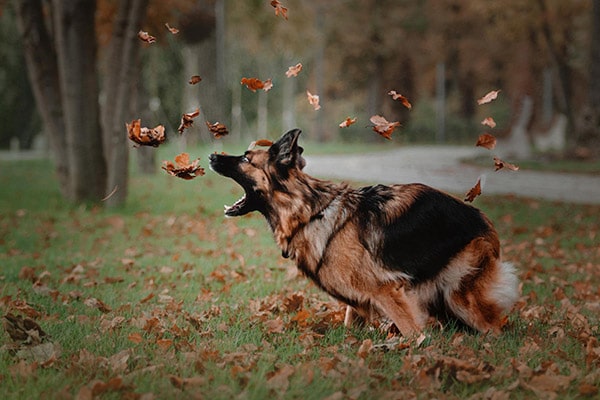If you’ve got a new German Shepherd puppy, then you may not know what to expect as the little fluffball grows.
The development cycle for a German Shepherd is similar to other dogs, and as you might expect they go from tiny to large is what seems like no time at all.
Below we’ll cover the basic growth stages for a German Shepherd puppy to give you a better idea of what to expect.
Birth to 2 Weeks Old (Neonatal Period)
Is this the cutest period for a German Shepherd puppy? It just might be.
During this period, the puppy is dependent on the mommy dog because it comes out of the womb pretty much blind and deaf (like all puppies).
You won’t really see it stray from the momma much.
In fact, the puppy will spend most of his time sleeping during this period.
By the end of this period you will start to see those little eyes open up and the puppy will start to attempt standing.
The puppy will be unsteady on his feet as he wobbles when trying to stand.
It is also normal to see those initial baby teeth start poking through the gums.
2 to 4 Weeks Old (Transitional Period)
During this period the puppy’s motor skills really start developing.
The puppy will start to show a bit of personality as it interacts with both you and the other puppies in the litter.
However, it will still be largely dependent on the mother during this period.
You should see the rest of the baby teeth coming in during this period.
And the puppy will become steadier on his feet when standing.
4 Weeks to 3 Months Old (Socialization Period)
Get ready because this is when the puppy will be ready for adventure and start walking and exploring on those steady legs.
They puppy will take its social cues from both you and the other dogs in the house.
This is the perfect time to start reinforcing some good behaviors while the puppy is open to learning.
During this period is also when the German Shepherd puppy’s ears will start to stand upright.
You’ll also notice that little tail start wagging more and this is usually when puppies start that weird practice of sniffing other dog’s butts.
3 Months to 6 Months Old (Juvenile Period)
Expect to start seeing lots of little puppy teeth on your floors because this is the period when your puppy will start losing his baby teeth.
And those adult dog teeth will start coming in, which means you’ve got a teething period when the puppy will want to chew on everything.
By this point, a German Shepherd puppy’s ears are fully upright and the dog is about 70% of the way to reaching its full grown size.
For female dogs, the heat cycle begins now and for the males they reach sexual maturity.
And you’ll notice that the puppy is ready to be more independent.
6 Months to 18 Months Old (Adolescence Period)
Prepare yourself for high energy because this period is when your German Shepherd puppy will be at it’s most hyper.
The puppy witching hour really sets in during this time.
It is important that you have a regular routine established for your dog by this period to counteract some of that hyperactivity.
Starting at around 16 months is when the attention span of your German Shepherd puppy is strongest, so this is a great time for training and obedience classes.

18+ Months Old (Adulthood)
By around 24 months old, the female dog is considered a full grown adult dog.
And by around 36 months, the male dog is considered a full grown adult dog.
Don’t expect the high energy levels of your pup to disappear just because it has reached adulthood.
A regular routine with exercise is still required to keep those zoomies at bay.
As your dog continues to age, you will notice that over time he becomes calmer and a more mellow pupper.
But German Shepherds never lose that high energy level.
Final Word
As you can see, your German Shepherd will go through some distinct behavioral stages as he grows.
But one thing that will remain constant is that high energy level that these dogs are known for.
